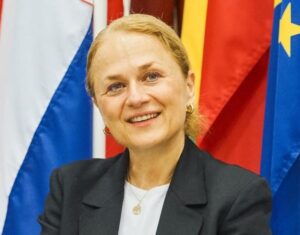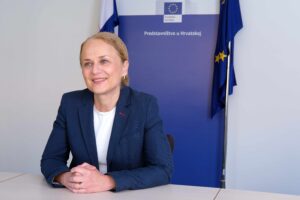Being a member of the EU is not only an economic benefit, but it means belonging to a community with which a country shares the same European values, within which a country seeks solutions for all of today’s challenges.
I believe there is great potential for Croatia in the full use of all opportunities offered by the internal market, as well as that it can strengthen its potential and competitiveness precisely within these frameworks, Zrinka Ujević, Head of the European Commission Representation in Croatia told the Diplomacy&Commerce magazine. In the run-up to the European elections, she would like to see a higher citizen turnout. We also discussed in detail the RePowerEU Plan,eurothe Commission’s response to the energy crisis stemming from Russia’s aggression against Ukraine in February 2022.

As an experienced diplomat who has dealt with European affairs for most of her career, how would you evaluate the achievements and benefits of Croatia’s membership in the EU so far? What would you single out as the most important benefits and achievements?
The benefits of membership for Croatia are multiple and cannot be measured in funds only, although the financial inflow of European funds to Croatia is significant. Croatia makes particularly good use of the funds available under the Recovery and Resilience Mechanism. The country is at the very top when compared to other EU Member States. Many projects financed via this Mechanism and many other EU funds programs have already been implemented and are visible to Croatian citizens. They are also a tangible indicator of the benefits of Croatia’s membership in the EU. The Pelješac Bridge is certainly one extremely visible example of the use of EU funds. There are numerous such infrestructural examples, but also other types of funds. And there will be even more over time. In the past years, Croatia has certainly handled numerous crises within the EU more easily than if it had had to go through them alone. There are numerous benefits for citizens, from various opportunities for young people and students, to the access of Croatian companies to the EU internal market now celebrating more than 30 years since it was first created. The single market certainly represents one of the most important benefits of our common European project.
Where do you see room for improvement, both for citizens and the economy in terms o fan even deeper integration, bearing in mind that some major changes require more time?
Croatia’s entry into Schengen and the eurozone is very important. Croatia has thus entered the very core of the Union and is part of the deepest European integration. Croatian citizens are already feeling the numerous benefits of the freedom of movement. They can cross borders freely without passports, with the reintroduced controls only temporary and the result of migratory movements. Citizens and companies increasingly use the opportunities offered by the internal market, the common currency facilitates business operations for companies and, again, free movement and travel of Croatian citizens in all EU countries. As a member of the EU, Croatia decides on all issues in the Council, defines strategic guidelines and creates the future of the Union together with other Member States. It participates in the creation of common European policies. Our priorities are the green and digital transition, which we are working on intensively and across all policy areas. All of this despite the crises we found ourselves in due to the pandemic and followed by the Russian aggression against Ukraine and the consequent energy crisis across the continent. Our climate goals are long-term ones and their implementation requires vision, determination, but also adaptation in various sectors. And we have also reserved significant funds to make the transition not only green and digital, but also a just one and an inclusive one for all Europeans.
Elections for the European Parliament are held in June. How is Croatia preparing for these elections?
The answer to that question lies in Croatia itself. What the European Commission would like to see is a higher turnout of Croatian citizens in the European Elections this June. A reminder – in Croatia they take place on Sunday, 9 June. The turnout of Croatian citizens in the European elections has indeed increased: from 20% in the first ad hoc elections in 2013, a bit over 25% in 2014, to almost 30% in the last European elections in 2019. However this figure is still relatively low, and Croatia still sits at the bottom of the turnout scale when compared to some other Member States. I do hope this will change and the turnout will rise on 9 June this year. We are now in the period of political campaigning of parties competing for entry into the European Parliament. We will certainly monitor their views on European policies, but the European Commission has no role in the electoral process and it acts with complete political neutrality.

In response to the disruptions in the energy market caused by the Russian invasion of Ukraine, the Commission launched the REPowerEU plan. The mechanism for recovery and resilience is at the heart of its implementation and financing. What does the recovery plan bring to Croatia?
The RePowerEU plan was agreed in response to the energy crisis that followed Russia’s aggression against Ukraine in February 2022. It encourages the diversification of supply and moves away from the use of Russian fossil fuels, and it also focuses on energy savings. The introduction of energy from renewable sources is encouraged, with the problems of energy poverty and bottlenecks in the distribution of electricity addressed. RePowerEU also promotes traffic with zero CO2 emissions, but also retraining and reskilling workforce to acquire green skills. An important highlight is also on the improvement of the security of energy supply in Europe. In the Croatian case, RePowerEU has enriched the Croatian Recovery and Resilience Plan (RRP) with an additional amount of 2.9 billion euros. The Croatian RRP now amounts to a total of 10 billion euros, as much as 14% of Croatian GDP. The plan also contains a number of measures that contribute to the achievement of the goals of the REPowerEU plan in the Europewide sense: a Europe independent of Russian fossil fuels, and this well before 2030. The measures within the plan promote energy efficiency, reduce dependence on fossil fuels by increasing the production and use of energy from renewable sources such as sustainable biomethane, hydrogen from renewable sources and geothermal energy.

The fight against climate change is one of the main priorities of the European Commission, and the European Green Deal is its ambitious plan to transform Europe into the first climate-neutral continent. How did Croatia perform within that plan?
We see the European Green Deal as a contribution to strengthening the competitiveness of the European Union in a global context. This applies particularly to the industry with net zero emissions, which will contribute to a faster and more efficient transition towards climate neutrality. The Net Zero Industry Act aims to increase the production capacity of those technologies that support the transition towards clean energy and the reduction of greenhouse gas emissions. It is important to attract investments in this sector and to create better conditions and easier access to the market for clean technologies. All this is a stake so that we could achieve out climate goals by 2030. And then, ultimately, the climate neutrality of Europe as a continent by 2050. These measures are also aimed at strengthening the competitiveness of the EU’s industry, at creating quality jobs and achieving energy independence of the European Union. Croatia is going through changes in a manner similar to those in other EU Member States, turning to renewable energy sources and gradually adapting, taking advantage of the opportunities offered by the Recovery and Resilience Mechanism to adapt its different sectors to these goals. At the same time, Croatia contributes to the efforts of the European Union as a whole to achieve climate neutrality and also European energy security. Croatia therefore welcomed this Act, emphasizing its importance for solving the vulnerability of the European Union in the energy sector.
What would you single out as the biggest challenges and risks for Europe and the EU in the period ahead and how to solve them?
Short-term challenges are related to the European Parliament elections, especially when it comes to safekeeping them from foreign interference in democratic processes, cyber-attacks and the spread of disinformation and fake news. And all this so that after the European Elections, an efficient process of forming new institutions would follow. At the same time, the EU’s Digital Services Act, the first such law in the world, is an important guardian of fundamental rights. With it, we have regulated the behavior of online platforms for sharing content so that we could prevent illegal activities on the internet and the spread of disinformation targeted towards European citizens. One challenge, for example, could potentially be the increase in the number of Eurosceptic representatives in the new seat of the European Parliament. In the long term, and much wider than the European Elections themselves, the challenges facing the EU continue to be numerous consequences of Russian aggression on Ukraine, in various areas – those related to European defense, but also economic and legal ones. It is exemplary that the EU has managed to maintain unity around Ukraine. Challenges could also come from crises in our neighbourhood to the south, for example in the Middle East. Along with these external, global challenges, there are also internal, institutional challenges. There is the question of internal reforms and institutional adjustments to new realities, including in the context of EU enlargement. There is general awareness that an appropriate internal reform is needed in parallel and this, the Commission acknowledges, must be done in parallel – the broadening and the widening of the EU. As far as more general risks are concerned, I see a divided Europe as one of the greatest dangers, which could then affect the EU’s reputation in global relations, but also its reputation among citizens. It is precisely because of this that I believe beyond a doubt that the European Union is the strongest when it acts unitedly. As Europeans, we should constantly strive for that. Then we can deal with challenges in solidarity, and with a better outcome, as we have all learned in the incumbent Commission mandate.